A Managerial Perspective on Healthcare Bargaining: A GMFC Case Study
VerifiedAdded on 2023/06/03
|10
|2443
|79
Case Study
AI Summary
This case study analyzes healthcare bargaining at GMFC (a company with 50,000 employees using self-insurance and subcontracting with VHC) from a managerial perspective. It discusses the impact of healthcare reforms, the need for negotiations in payments, and the challenges posed by trade union interventions. The study explores the privatization of healthcare services, policies for equal division of labor, and theoretical considerations for maintaining healthcare service providers. It also touches on the Patient Protection and Affordable Care Act (PPACA) and the potential impact of the Cadillac tax. The study concludes by recommending job satisfaction and proper wages for employees to ensure wellbeing and effective healthcare services, aligning with social identity theory and emphasizing the importance of patient-centric services. Desklib provides students access to a wealth of study resources including past papers and solved assignments.
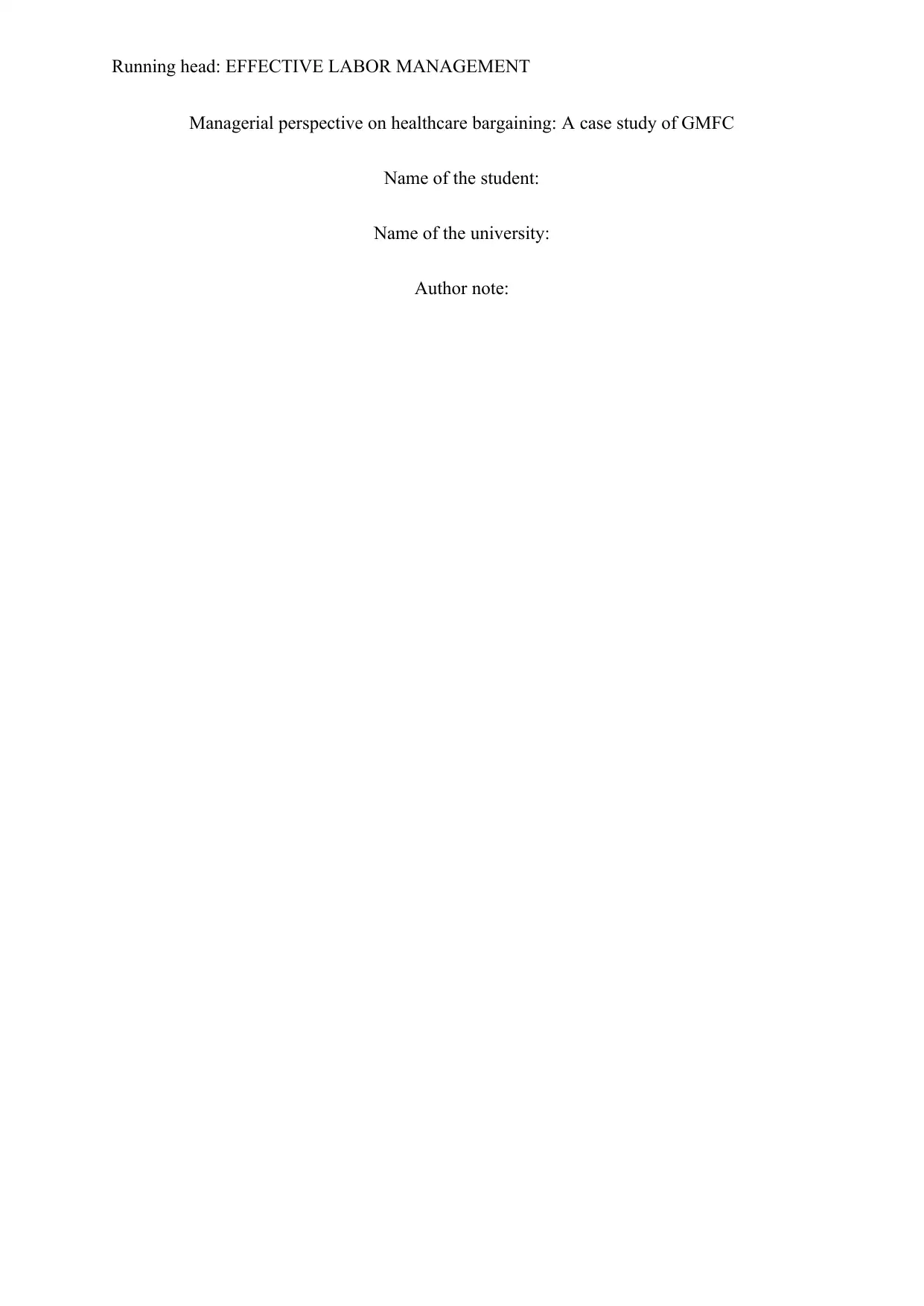
Running head: EFFECTIVE LABOR MANAGEMENT
Managerial perspective on healthcare bargaining: A case study of GMFC
Name of the student:
Name of the university:
Author note:
Managerial perspective on healthcare bargaining: A case study of GMFC
Name of the student:
Name of the university:
Author note:
Paraphrase This Document
Need a fresh take? Get an instant paraphrase of this document with our AI Paraphraser
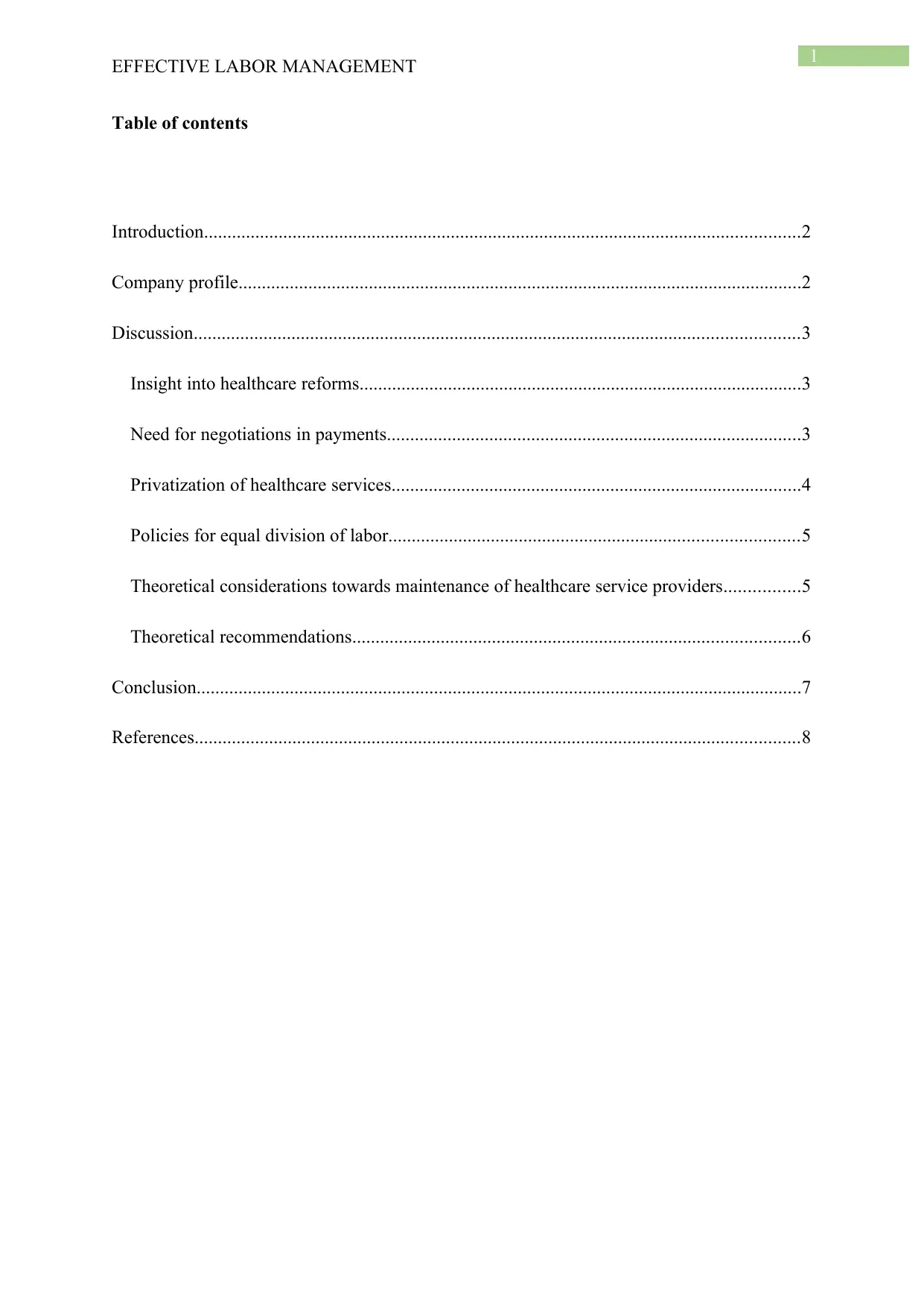
1
EFFECTIVE LABOR MANAGEMENT
Table of contents
Introduction................................................................................................................................2
Company profile.........................................................................................................................2
Discussion..................................................................................................................................3
Insight into healthcare reforms...............................................................................................3
Need for negotiations in payments.........................................................................................3
Privatization of healthcare services........................................................................................4
Policies for equal division of labor........................................................................................5
Theoretical considerations towards maintenance of healthcare service providers................5
Theoretical recommendations................................................................................................6
Conclusion..................................................................................................................................7
References..................................................................................................................................8
EFFECTIVE LABOR MANAGEMENT
Table of contents
Introduction................................................................................................................................2
Company profile.........................................................................................................................2
Discussion..................................................................................................................................3
Insight into healthcare reforms...............................................................................................3
Need for negotiations in payments.........................................................................................3
Privatization of healthcare services........................................................................................4
Policies for equal division of labor........................................................................................5
Theoretical considerations towards maintenance of healthcare service providers................5
Theoretical recommendations................................................................................................6
Conclusion..................................................................................................................................7
References..................................................................................................................................8
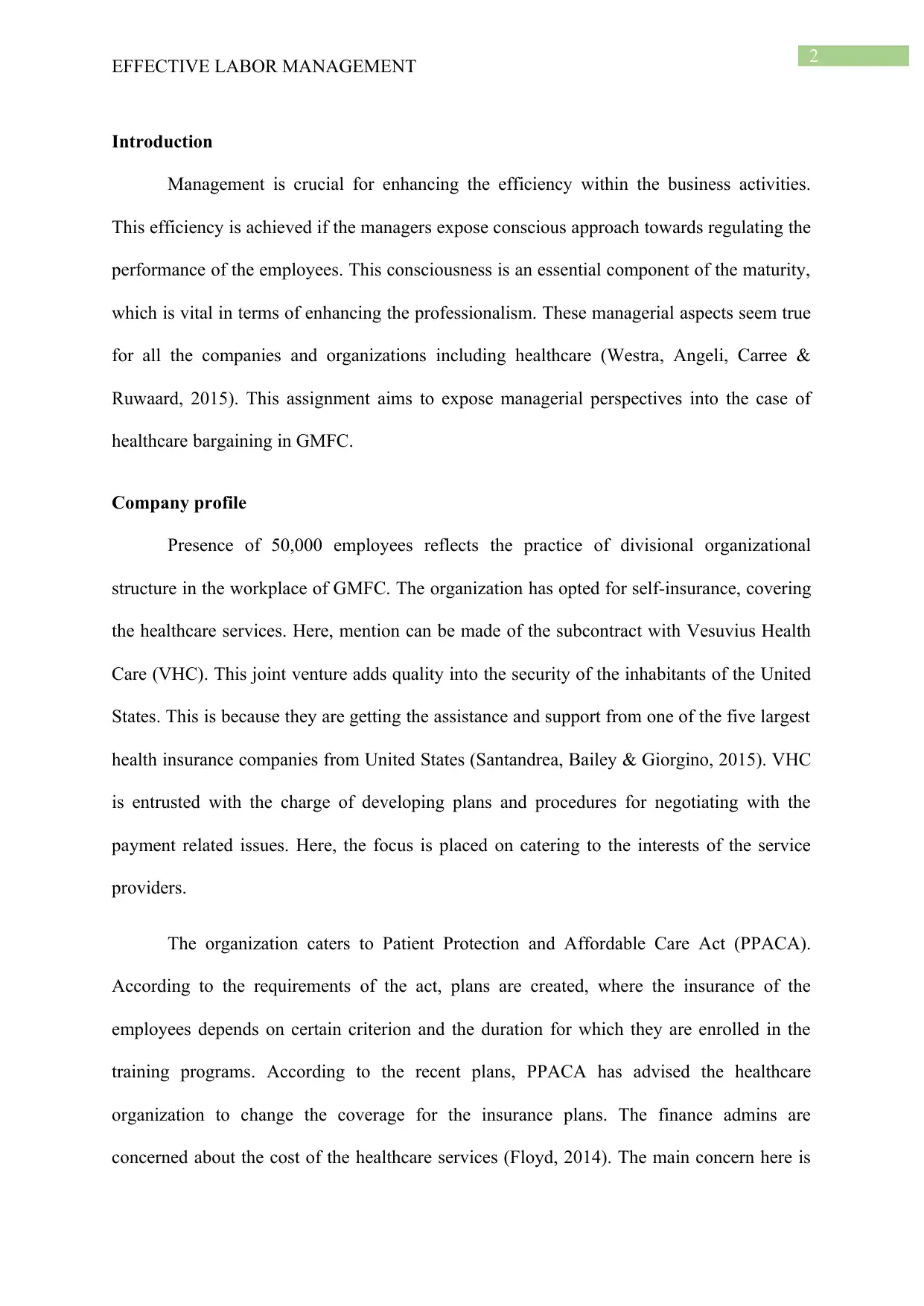
2
EFFECTIVE LABOR MANAGEMENT
Introduction
Management is crucial for enhancing the efficiency within the business activities.
This efficiency is achieved if the managers expose conscious approach towards regulating the
performance of the employees. This consciousness is an essential component of the maturity,
which is vital in terms of enhancing the professionalism. These managerial aspects seem true
for all the companies and organizations including healthcare (Westra, Angeli, Carree &
Ruwaard, 2015). This assignment aims to expose managerial perspectives into the case of
healthcare bargaining in GMFC.
Company profile
Presence of 50,000 employees reflects the practice of divisional organizational
structure in the workplace of GMFC. The organization has opted for self-insurance, covering
the healthcare services. Here, mention can be made of the subcontract with Vesuvius Health
Care (VHC). This joint venture adds quality into the security of the inhabitants of the United
States. This is because they are getting the assistance and support from one of the five largest
health insurance companies from United States (Santandrea, Bailey & Giorgino, 2015). VHC
is entrusted with the charge of developing plans and procedures for negotiating with the
payment related issues. Here, the focus is placed on catering to the interests of the service
providers.
The organization caters to Patient Protection and Affordable Care Act (PPACA).
According to the requirements of the act, plans are created, where the insurance of the
employees depends on certain criterion and the duration for which they are enrolled in the
training programs. According to the recent plans, PPACA has advised the healthcare
organization to change the coverage for the insurance plans. The finance admins are
concerned about the cost of the healthcare services (Floyd, 2014). The main concern here is
EFFECTIVE LABOR MANAGEMENT
Introduction
Management is crucial for enhancing the efficiency within the business activities.
This efficiency is achieved if the managers expose conscious approach towards regulating the
performance of the employees. This consciousness is an essential component of the maturity,
which is vital in terms of enhancing the professionalism. These managerial aspects seem true
for all the companies and organizations including healthcare (Westra, Angeli, Carree &
Ruwaard, 2015). This assignment aims to expose managerial perspectives into the case of
healthcare bargaining in GMFC.
Company profile
Presence of 50,000 employees reflects the practice of divisional organizational
structure in the workplace of GMFC. The organization has opted for self-insurance, covering
the healthcare services. Here, mention can be made of the subcontract with Vesuvius Health
Care (VHC). This joint venture adds quality into the security of the inhabitants of the United
States. This is because they are getting the assistance and support from one of the five largest
health insurance companies from United States (Santandrea, Bailey & Giorgino, 2015). VHC
is entrusted with the charge of developing plans and procedures for negotiating with the
payment related issues. Here, the focus is placed on catering to the interests of the service
providers.
The organization caters to Patient Protection and Affordable Care Act (PPACA).
According to the requirements of the act, plans are created, where the insurance of the
employees depends on certain criterion and the duration for which they are enrolled in the
training programs. According to the recent plans, PPACA has advised the healthcare
organization to change the coverage for the insurance plans. The finance admins are
concerned about the cost of the healthcare services (Floyd, 2014). The main concern here is
⊘ This is a preview!⊘
Do you want full access?
Subscribe today to unlock all pages.

Trusted by 1+ million students worldwide
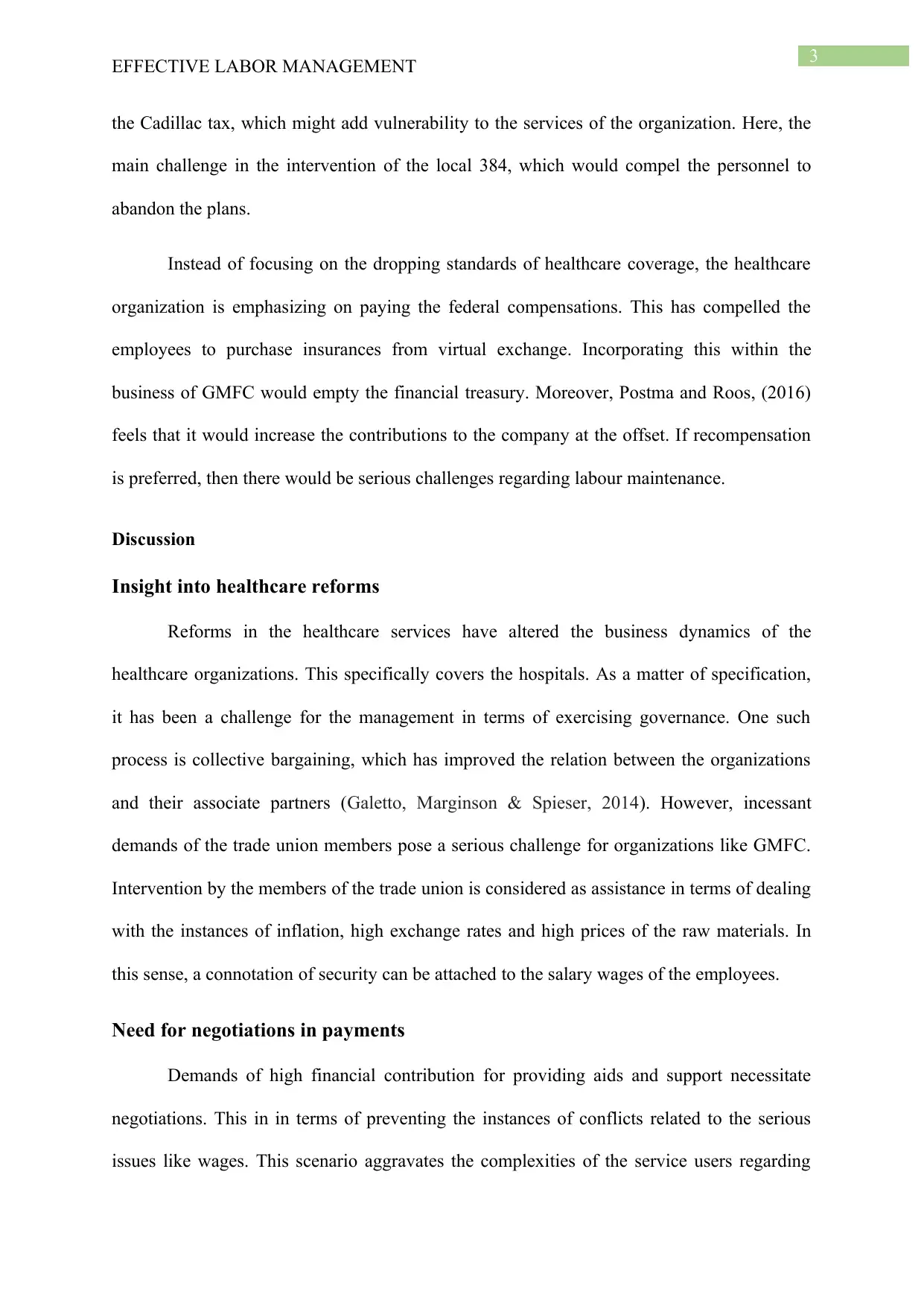
3
EFFECTIVE LABOR MANAGEMENT
the Cadillac tax, which might add vulnerability to the services of the organization. Here, the
main challenge in the intervention of the local 384, which would compel the personnel to
abandon the plans.
Instead of focusing on the dropping standards of healthcare coverage, the healthcare
organization is emphasizing on paying the federal compensations. This has compelled the
employees to purchase insurances from virtual exchange. Incorporating this within the
business of GMFC would empty the financial treasury. Moreover, Postma and Roos, (2016)
feels that it would increase the contributions to the company at the offset. If recompensation
is preferred, then there would be serious challenges regarding labour maintenance.
Discussion
Insight into healthcare reforms
Reforms in the healthcare services have altered the business dynamics of the
healthcare organizations. This specifically covers the hospitals. As a matter of specification,
it has been a challenge for the management in terms of exercising governance. One such
process is collective bargaining, which has improved the relation between the organizations
and their associate partners (Galetto, Marginson & Spieser, 2014). However, incessant
demands of the trade union members pose a serious challenge for organizations like GMFC.
Intervention by the members of the trade union is considered as assistance in terms of dealing
with the instances of inflation, high exchange rates and high prices of the raw materials. In
this sense, a connotation of security can be attached to the salary wages of the employees.
Need for negotiations in payments
Demands of high financial contribution for providing aids and support necessitate
negotiations. This in in terms of preventing the instances of conflicts related to the serious
issues like wages. This scenario aggravates the complexities of the service users regarding
EFFECTIVE LABOR MANAGEMENT
the Cadillac tax, which might add vulnerability to the services of the organization. Here, the
main challenge in the intervention of the local 384, which would compel the personnel to
abandon the plans.
Instead of focusing on the dropping standards of healthcare coverage, the healthcare
organization is emphasizing on paying the federal compensations. This has compelled the
employees to purchase insurances from virtual exchange. Incorporating this within the
business of GMFC would empty the financial treasury. Moreover, Postma and Roos, (2016)
feels that it would increase the contributions to the company at the offset. If recompensation
is preferred, then there would be serious challenges regarding labour maintenance.
Discussion
Insight into healthcare reforms
Reforms in the healthcare services have altered the business dynamics of the
healthcare organizations. This specifically covers the hospitals. As a matter of specification,
it has been a challenge for the management in terms of exercising governance. One such
process is collective bargaining, which has improved the relation between the organizations
and their associate partners (Galetto, Marginson & Spieser, 2014). However, incessant
demands of the trade union members pose a serious challenge for organizations like GMFC.
Intervention by the members of the trade union is considered as assistance in terms of dealing
with the instances of inflation, high exchange rates and high prices of the raw materials. In
this sense, a connotation of security can be attached to the salary wages of the employees.
Need for negotiations in payments
Demands of high financial contribution for providing aids and support necessitate
negotiations. This in in terms of preventing the instances of conflicts related to the serious
issues like wages. This scenario aggravates the complexities of the service users regarding
Paraphrase This Document
Need a fresh take? Get an instant paraphrase of this document with our AI Paraphraser
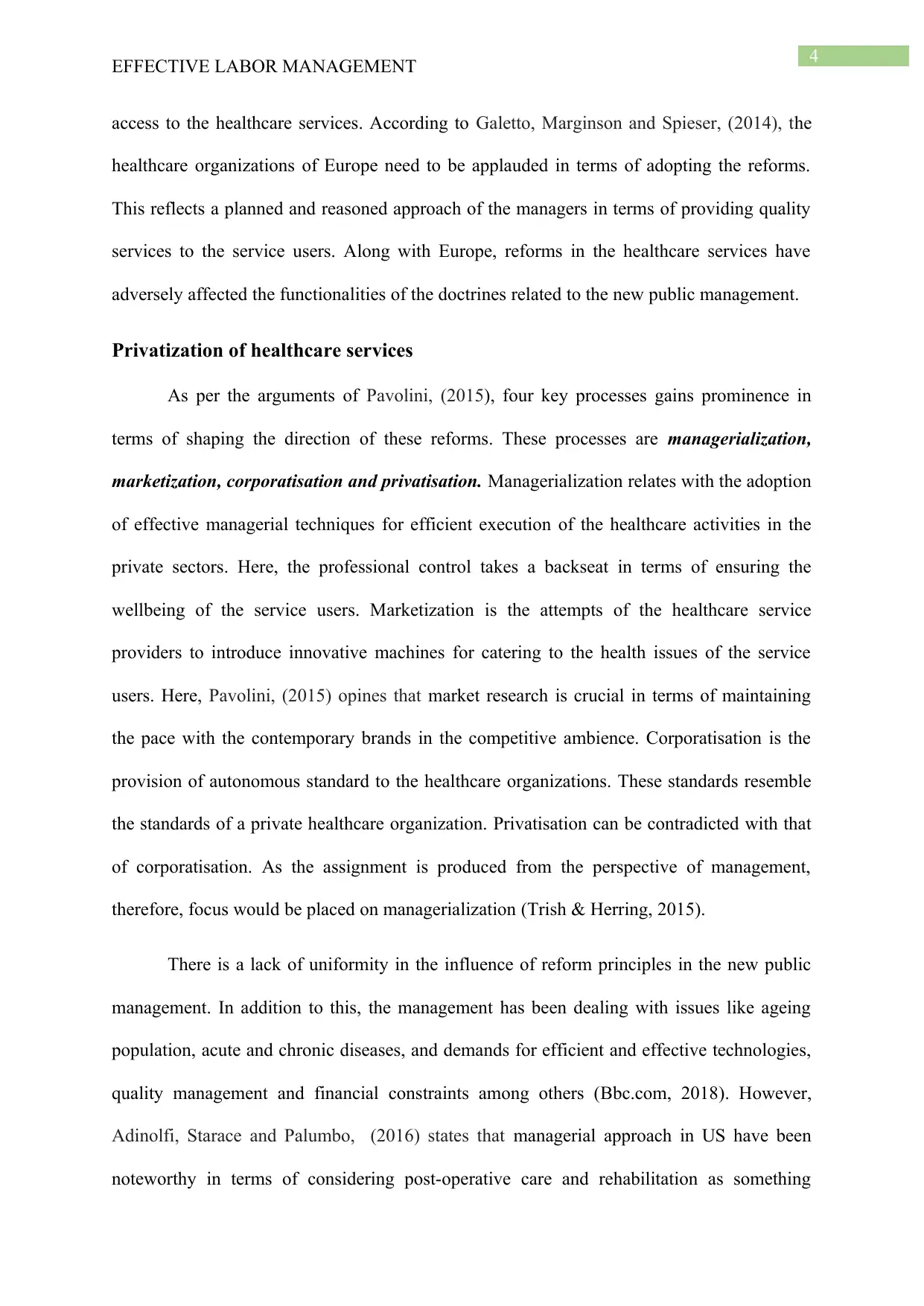
4
EFFECTIVE LABOR MANAGEMENT
access to the healthcare services. According to Galetto, Marginson and Spieser, (2014), the
healthcare organizations of Europe need to be applauded in terms of adopting the reforms.
This reflects a planned and reasoned approach of the managers in terms of providing quality
services to the service users. Along with Europe, reforms in the healthcare services have
adversely affected the functionalities of the doctrines related to the new public management.
Privatization of healthcare services
As per the arguments of Pavolini, (2015), four key processes gains prominence in
terms of shaping the direction of these reforms. These processes are managerialization,
marketization, corporatisation and privatisation. Managerialization relates with the adoption
of effective managerial techniques for efficient execution of the healthcare activities in the
private sectors. Here, the professional control takes a backseat in terms of ensuring the
wellbeing of the service users. Marketization is the attempts of the healthcare service
providers to introduce innovative machines for catering to the health issues of the service
users. Here, Pavolini, (2015) opines that market research is crucial in terms of maintaining
the pace with the contemporary brands in the competitive ambience. Corporatisation is the
provision of autonomous standard to the healthcare organizations. These standards resemble
the standards of a private healthcare organization. Privatisation can be contradicted with that
of corporatisation. As the assignment is produced from the perspective of management,
therefore, focus would be placed on managerialization (Trish & Herring, 2015).
There is a lack of uniformity in the influence of reform principles in the new public
management. In addition to this, the management has been dealing with issues like ageing
population, acute and chronic diseases, and demands for efficient and effective technologies,
quality management and financial constraints among others (Bbc.com, 2018). However,
Adinolfi, Starace and Palumbo, (2016) states that managerial approach in US have been
noteworthy in terms of considering post-operative care and rehabilitation as something
EFFECTIVE LABOR MANAGEMENT
access to the healthcare services. According to Galetto, Marginson and Spieser, (2014), the
healthcare organizations of Europe need to be applauded in terms of adopting the reforms.
This reflects a planned and reasoned approach of the managers in terms of providing quality
services to the service users. Along with Europe, reforms in the healthcare services have
adversely affected the functionalities of the doctrines related to the new public management.
Privatization of healthcare services
As per the arguments of Pavolini, (2015), four key processes gains prominence in
terms of shaping the direction of these reforms. These processes are managerialization,
marketization, corporatisation and privatisation. Managerialization relates with the adoption
of effective managerial techniques for efficient execution of the healthcare activities in the
private sectors. Here, the professional control takes a backseat in terms of ensuring the
wellbeing of the service users. Marketization is the attempts of the healthcare service
providers to introduce innovative machines for catering to the health issues of the service
users. Here, Pavolini, (2015) opines that market research is crucial in terms of maintaining
the pace with the contemporary brands in the competitive ambience. Corporatisation is the
provision of autonomous standard to the healthcare organizations. These standards resemble
the standards of a private healthcare organization. Privatisation can be contradicted with that
of corporatisation. As the assignment is produced from the perspective of management,
therefore, focus would be placed on managerialization (Trish & Herring, 2015).
There is a lack of uniformity in the influence of reform principles in the new public
management. In addition to this, the management has been dealing with issues like ageing
population, acute and chronic diseases, and demands for efficient and effective technologies,
quality management and financial constraints among others (Bbc.com, 2018). However,
Adinolfi, Starace and Palumbo, (2016) states that managerial approach in US have been
noteworthy in terms of considering post-operative care and rehabilitation as something
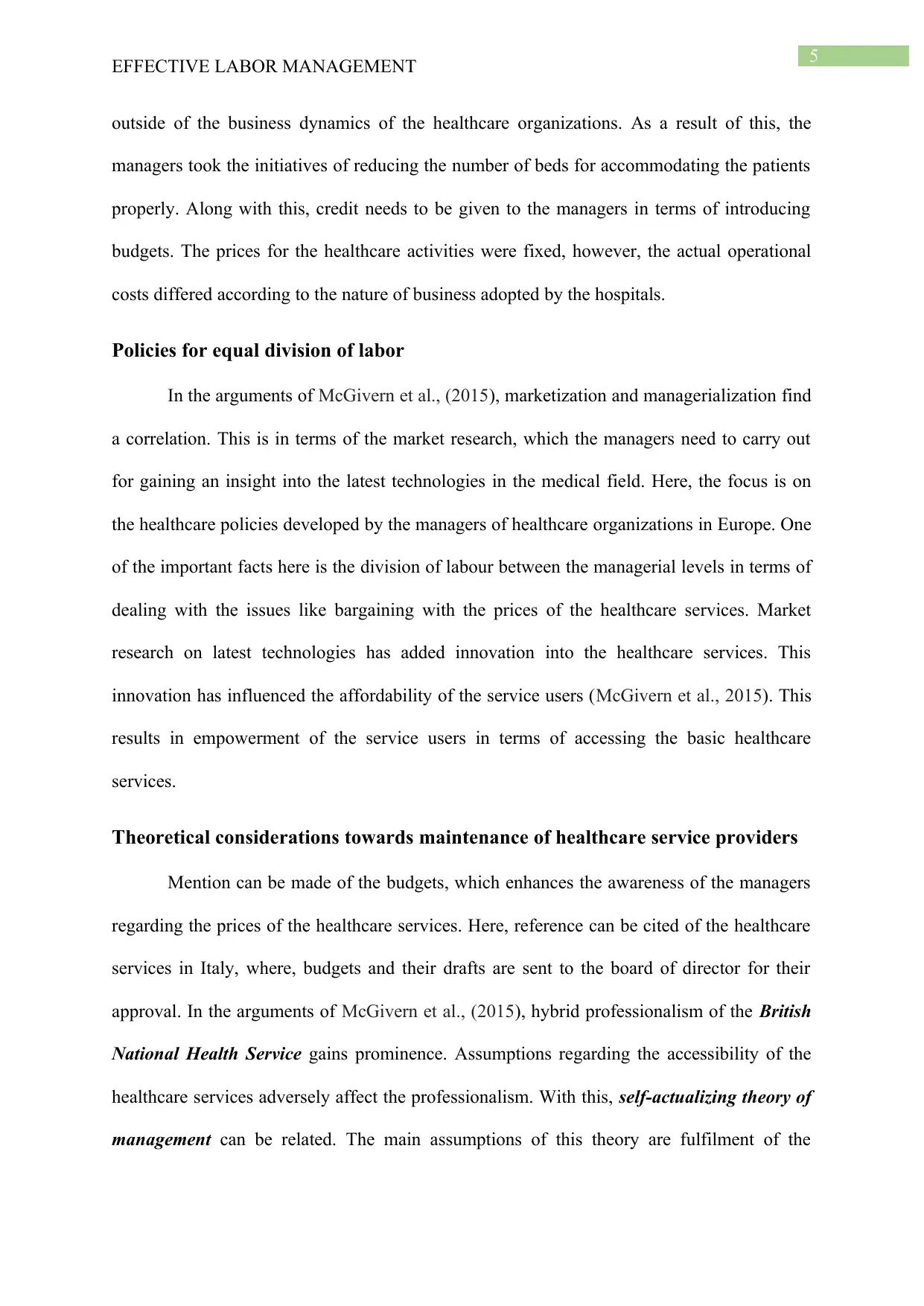
5
EFFECTIVE LABOR MANAGEMENT
outside of the business dynamics of the healthcare organizations. As a result of this, the
managers took the initiatives of reducing the number of beds for accommodating the patients
properly. Along with this, credit needs to be given to the managers in terms of introducing
budgets. The prices for the healthcare activities were fixed, however, the actual operational
costs differed according to the nature of business adopted by the hospitals.
Policies for equal division of labor
In the arguments of McGivern et al., (2015), marketization and managerialization find
a correlation. This is in terms of the market research, which the managers need to carry out
for gaining an insight into the latest technologies in the medical field. Here, the focus is on
the healthcare policies developed by the managers of healthcare organizations in Europe. One
of the important facts here is the division of labour between the managerial levels in terms of
dealing with the issues like bargaining with the prices of the healthcare services. Market
research on latest technologies has added innovation into the healthcare services. This
innovation has influenced the affordability of the service users (McGivern et al., 2015). This
results in empowerment of the service users in terms of accessing the basic healthcare
services.
Theoretical considerations towards maintenance of healthcare service providers
Mention can be made of the budgets, which enhances the awareness of the managers
regarding the prices of the healthcare services. Here, reference can be cited of the healthcare
services in Italy, where, budgets and their drafts are sent to the board of director for their
approval. In the arguments of McGivern et al., (2015), hybrid professionalism of the British
National Health Service gains prominence. Assumptions regarding the accessibility of the
healthcare services adversely affect the professionalism. With this, self-actualizing theory of
management can be related. The main assumptions of this theory are fulfilment of the
EFFECTIVE LABOR MANAGEMENT
outside of the business dynamics of the healthcare organizations. As a result of this, the
managers took the initiatives of reducing the number of beds for accommodating the patients
properly. Along with this, credit needs to be given to the managers in terms of introducing
budgets. The prices for the healthcare activities were fixed, however, the actual operational
costs differed according to the nature of business adopted by the hospitals.
Policies for equal division of labor
In the arguments of McGivern et al., (2015), marketization and managerialization find
a correlation. This is in terms of the market research, which the managers need to carry out
for gaining an insight into the latest technologies in the medical field. Here, the focus is on
the healthcare policies developed by the managers of healthcare organizations in Europe. One
of the important facts here is the division of labour between the managerial levels in terms of
dealing with the issues like bargaining with the prices of the healthcare services. Market
research on latest technologies has added innovation into the healthcare services. This
innovation has influenced the affordability of the service users (McGivern et al., 2015). This
results in empowerment of the service users in terms of accessing the basic healthcare
services.
Theoretical considerations towards maintenance of healthcare service providers
Mention can be made of the budgets, which enhances the awareness of the managers
regarding the prices of the healthcare services. Here, reference can be cited of the healthcare
services in Italy, where, budgets and their drafts are sent to the board of director for their
approval. In the arguments of McGivern et al., (2015), hybrid professionalism of the British
National Health Service gains prominence. Assumptions regarding the accessibility of the
healthcare services adversely affect the professionalism. With this, self-actualizing theory of
management can be related. The main assumptions of this theory are fulfilment of the
⊘ This is a preview!⊘
Do you want full access?
Subscribe today to unlock all pages.

Trusted by 1+ million students worldwide
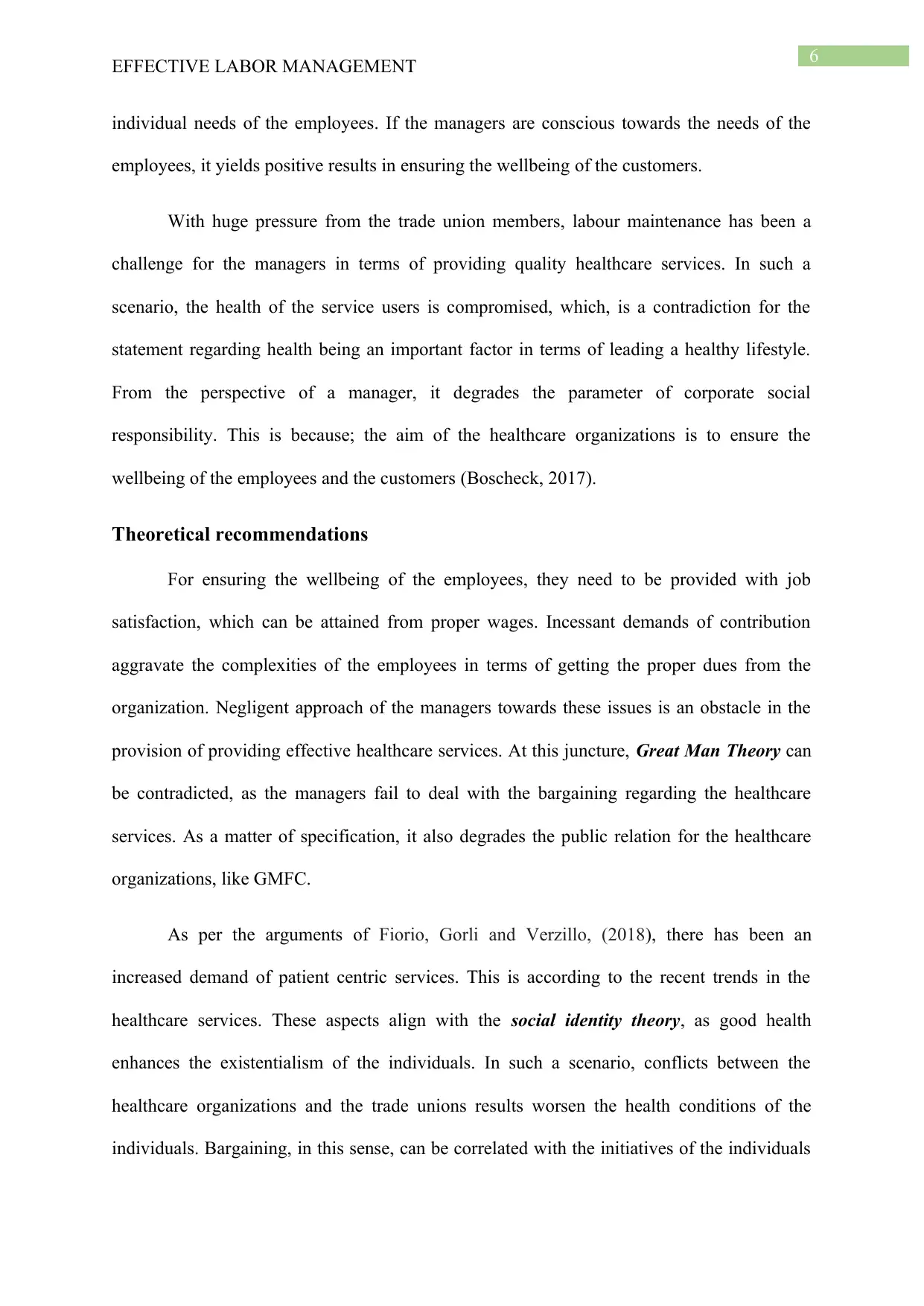
6
EFFECTIVE LABOR MANAGEMENT
individual needs of the employees. If the managers are conscious towards the needs of the
employees, it yields positive results in ensuring the wellbeing of the customers.
With huge pressure from the trade union members, labour maintenance has been a
challenge for the managers in terms of providing quality healthcare services. In such a
scenario, the health of the service users is compromised, which, is a contradiction for the
statement regarding health being an important factor in terms of leading a healthy lifestyle.
From the perspective of a manager, it degrades the parameter of corporate social
responsibility. This is because; the aim of the healthcare organizations is to ensure the
wellbeing of the employees and the customers (Boscheck, 2017).
Theoretical recommendations
For ensuring the wellbeing of the employees, they need to be provided with job
satisfaction, which can be attained from proper wages. Incessant demands of contribution
aggravate the complexities of the employees in terms of getting the proper dues from the
organization. Negligent approach of the managers towards these issues is an obstacle in the
provision of providing effective healthcare services. At this juncture, Great Man Theory can
be contradicted, as the managers fail to deal with the bargaining regarding the healthcare
services. As a matter of specification, it also degrades the public relation for the healthcare
organizations, like GMFC.
As per the arguments of Fiorio, Gorli and Verzillo, (2018), there has been an
increased demand of patient centric services. This is according to the recent trends in the
healthcare services. These aspects align with the social identity theory, as good health
enhances the existentialism of the individuals. In such a scenario, conflicts between the
healthcare organizations and the trade unions results worsen the health conditions of the
individuals. Bargaining, in this sense, can be correlated with the initiatives of the individuals
EFFECTIVE LABOR MANAGEMENT
individual needs of the employees. If the managers are conscious towards the needs of the
employees, it yields positive results in ensuring the wellbeing of the customers.
With huge pressure from the trade union members, labour maintenance has been a
challenge for the managers in terms of providing quality healthcare services. In such a
scenario, the health of the service users is compromised, which, is a contradiction for the
statement regarding health being an important factor in terms of leading a healthy lifestyle.
From the perspective of a manager, it degrades the parameter of corporate social
responsibility. This is because; the aim of the healthcare organizations is to ensure the
wellbeing of the employees and the customers (Boscheck, 2017).
Theoretical recommendations
For ensuring the wellbeing of the employees, they need to be provided with job
satisfaction, which can be attained from proper wages. Incessant demands of contribution
aggravate the complexities of the employees in terms of getting the proper dues from the
organization. Negligent approach of the managers towards these issues is an obstacle in the
provision of providing effective healthcare services. At this juncture, Great Man Theory can
be contradicted, as the managers fail to deal with the bargaining regarding the healthcare
services. As a matter of specification, it also degrades the public relation for the healthcare
organizations, like GMFC.
As per the arguments of Fiorio, Gorli and Verzillo, (2018), there has been an
increased demand of patient centric services. This is according to the recent trends in the
healthcare services. These aspects align with the social identity theory, as good health
enhances the existentialism of the individuals. In such a scenario, conflicts between the
healthcare organizations and the trade unions results worsen the health conditions of the
individuals. Bargaining, in this sense, can be correlated with the initiatives of the individuals
Paraphrase This Document
Need a fresh take? Get an instant paraphrase of this document with our AI Paraphraser
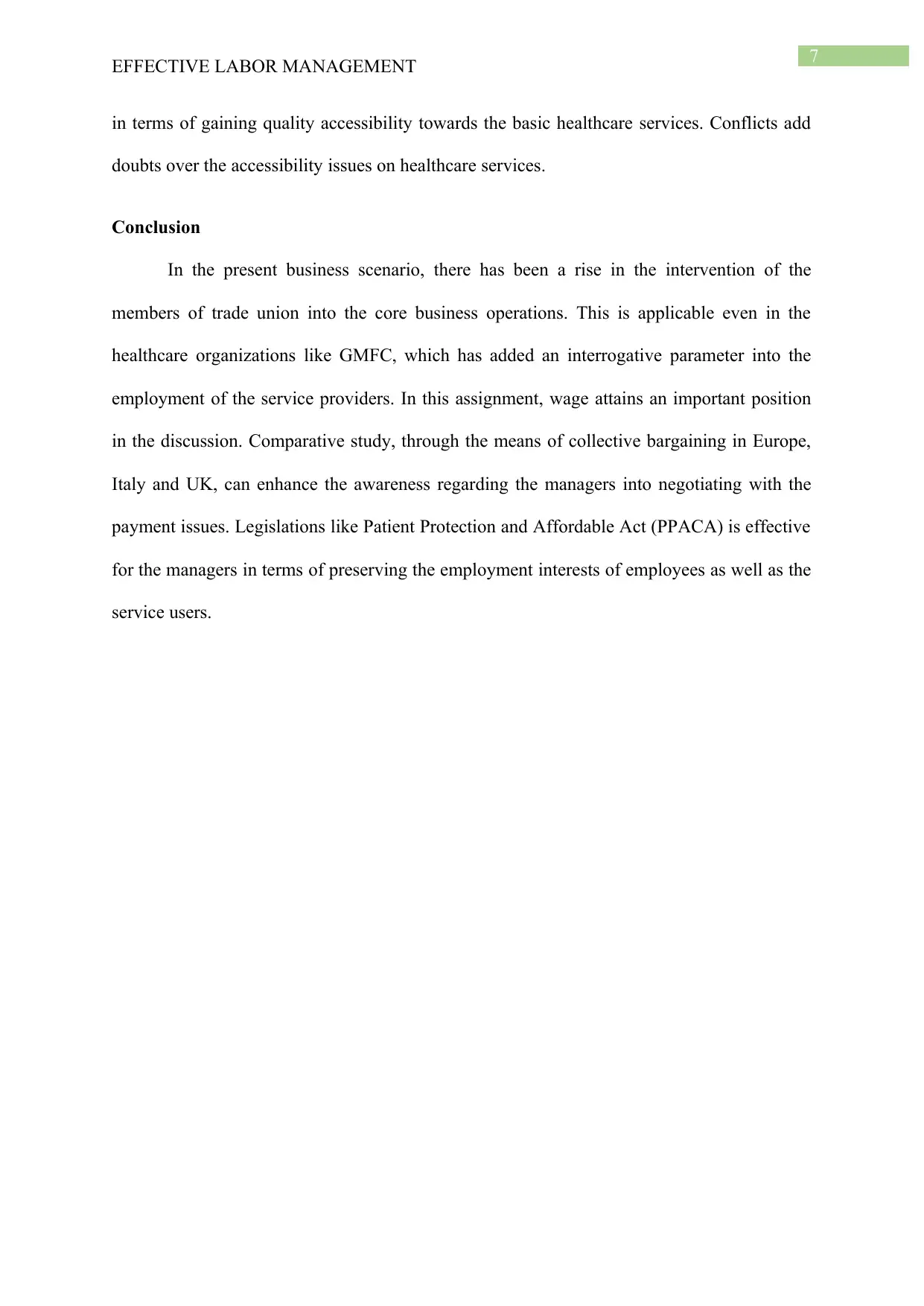
7
EFFECTIVE LABOR MANAGEMENT
in terms of gaining quality accessibility towards the basic healthcare services. Conflicts add
doubts over the accessibility issues on healthcare services.
Conclusion
In the present business scenario, there has been a rise in the intervention of the
members of trade union into the core business operations. This is applicable even in the
healthcare organizations like GMFC, which has added an interrogative parameter into the
employment of the service providers. In this assignment, wage attains an important position
in the discussion. Comparative study, through the means of collective bargaining in Europe,
Italy and UK, can enhance the awareness regarding the managers into negotiating with the
payment issues. Legislations like Patient Protection and Affordable Act (PPACA) is effective
for the managers in terms of preserving the employment interests of employees as well as the
service users.
EFFECTIVE LABOR MANAGEMENT
in terms of gaining quality accessibility towards the basic healthcare services. Conflicts add
doubts over the accessibility issues on healthcare services.
Conclusion
In the present business scenario, there has been a rise in the intervention of the
members of trade union into the core business operations. This is applicable even in the
healthcare organizations like GMFC, which has added an interrogative parameter into the
employment of the service providers. In this assignment, wage attains an important position
in the discussion. Comparative study, through the means of collective bargaining in Europe,
Italy and UK, can enhance the awareness regarding the managers into negotiating with the
payment issues. Legislations like Patient Protection and Affordable Act (PPACA) is effective
for the managers in terms of preserving the employment interests of employees as well as the
service users.
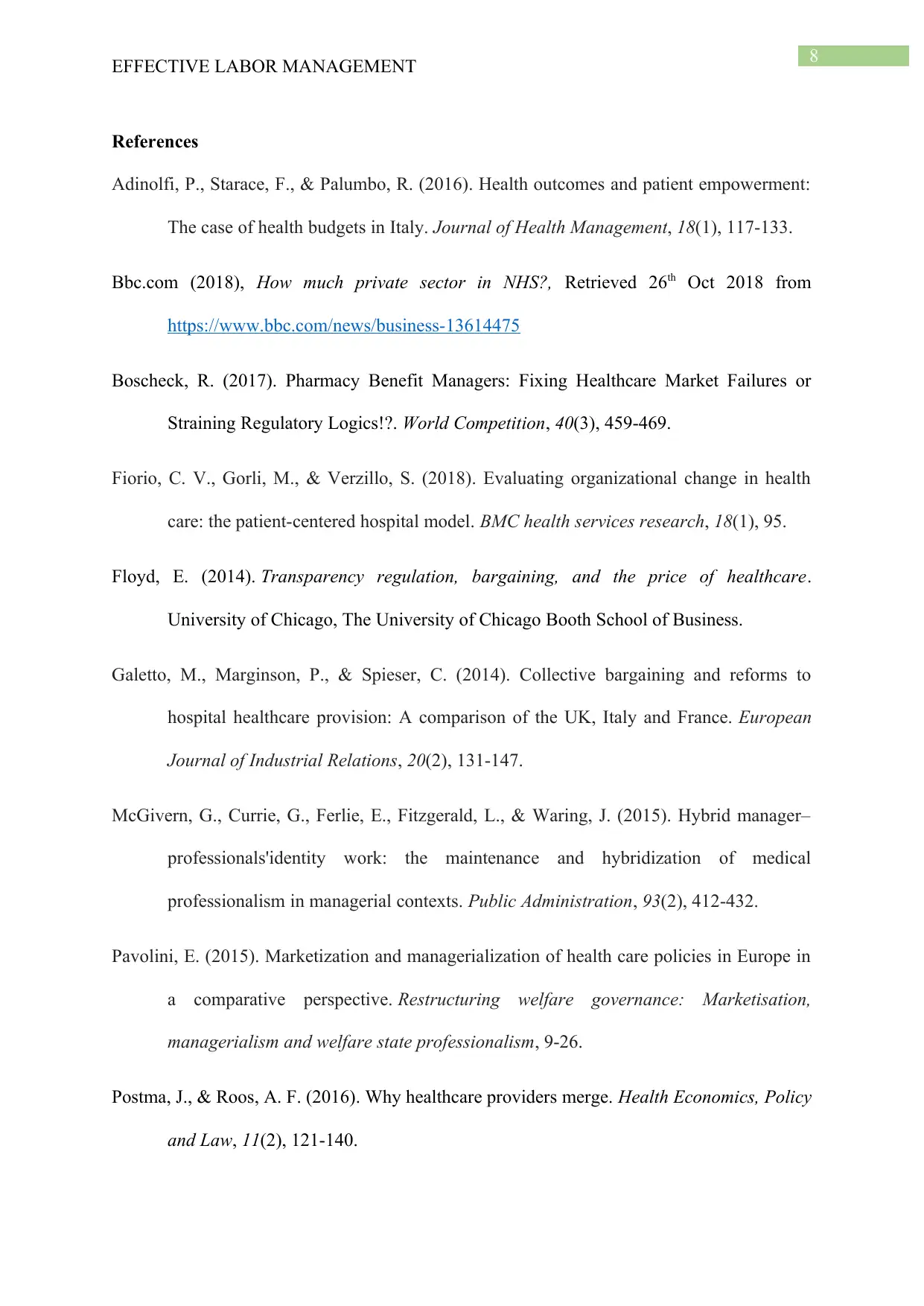
8
EFFECTIVE LABOR MANAGEMENT
References
Adinolfi, P., Starace, F., & Palumbo, R. (2016). Health outcomes and patient empowerment:
The case of health budgets in Italy. Journal of Health Management, 18(1), 117-133.
Bbc.com (2018), How much private sector in NHS?, Retrieved 26th Oct 2018 from
https://www.bbc.com/news/business-13614475
Boscheck, R. (2017). Pharmacy Benefit Managers: Fixing Healthcare Market Failures or
Straining Regulatory Logics!?. World Competition, 40(3), 459-469.
Fiorio, C. V., Gorli, M., & Verzillo, S. (2018). Evaluating organizational change in health
care: the patient-centered hospital model. BMC health services research, 18(1), 95.
Floyd, E. (2014). Transparency regulation, bargaining, and the price of healthcare.
University of Chicago, The University of Chicago Booth School of Business.
Galetto, M., Marginson, P., & Spieser, C. (2014). Collective bargaining and reforms to
hospital healthcare provision: A comparison of the UK, Italy and France. European
Journal of Industrial Relations, 20(2), 131-147.
McGivern, G., Currie, G., Ferlie, E., Fitzgerald, L., & Waring, J. (2015). Hybrid manager–
professionals'identity work: the maintenance and hybridization of medical
professionalism in managerial contexts. Public Administration, 93(2), 412-432.
Pavolini, E. (2015). Marketization and managerialization of health care policies in Europe in
a comparative perspective. Restructuring welfare governance: Marketisation,
managerialism and welfare state professionalism, 9-26.
Postma, J., & Roos, A. F. (2016). Why healthcare providers merge. Health Economics, Policy
and Law, 11(2), 121-140.
EFFECTIVE LABOR MANAGEMENT
References
Adinolfi, P., Starace, F., & Palumbo, R. (2016). Health outcomes and patient empowerment:
The case of health budgets in Italy. Journal of Health Management, 18(1), 117-133.
Bbc.com (2018), How much private sector in NHS?, Retrieved 26th Oct 2018 from
https://www.bbc.com/news/business-13614475
Boscheck, R. (2017). Pharmacy Benefit Managers: Fixing Healthcare Market Failures or
Straining Regulatory Logics!?. World Competition, 40(3), 459-469.
Fiorio, C. V., Gorli, M., & Verzillo, S. (2018). Evaluating organizational change in health
care: the patient-centered hospital model. BMC health services research, 18(1), 95.
Floyd, E. (2014). Transparency regulation, bargaining, and the price of healthcare.
University of Chicago, The University of Chicago Booth School of Business.
Galetto, M., Marginson, P., & Spieser, C. (2014). Collective bargaining and reforms to
hospital healthcare provision: A comparison of the UK, Italy and France. European
Journal of Industrial Relations, 20(2), 131-147.
McGivern, G., Currie, G., Ferlie, E., Fitzgerald, L., & Waring, J. (2015). Hybrid manager–
professionals'identity work: the maintenance and hybridization of medical
professionalism in managerial contexts. Public Administration, 93(2), 412-432.
Pavolini, E. (2015). Marketization and managerialization of health care policies in Europe in
a comparative perspective. Restructuring welfare governance: Marketisation,
managerialism and welfare state professionalism, 9-26.
Postma, J., & Roos, A. F. (2016). Why healthcare providers merge. Health Economics, Policy
and Law, 11(2), 121-140.
⊘ This is a preview!⊘
Do you want full access?
Subscribe today to unlock all pages.

Trusted by 1+ million students worldwide
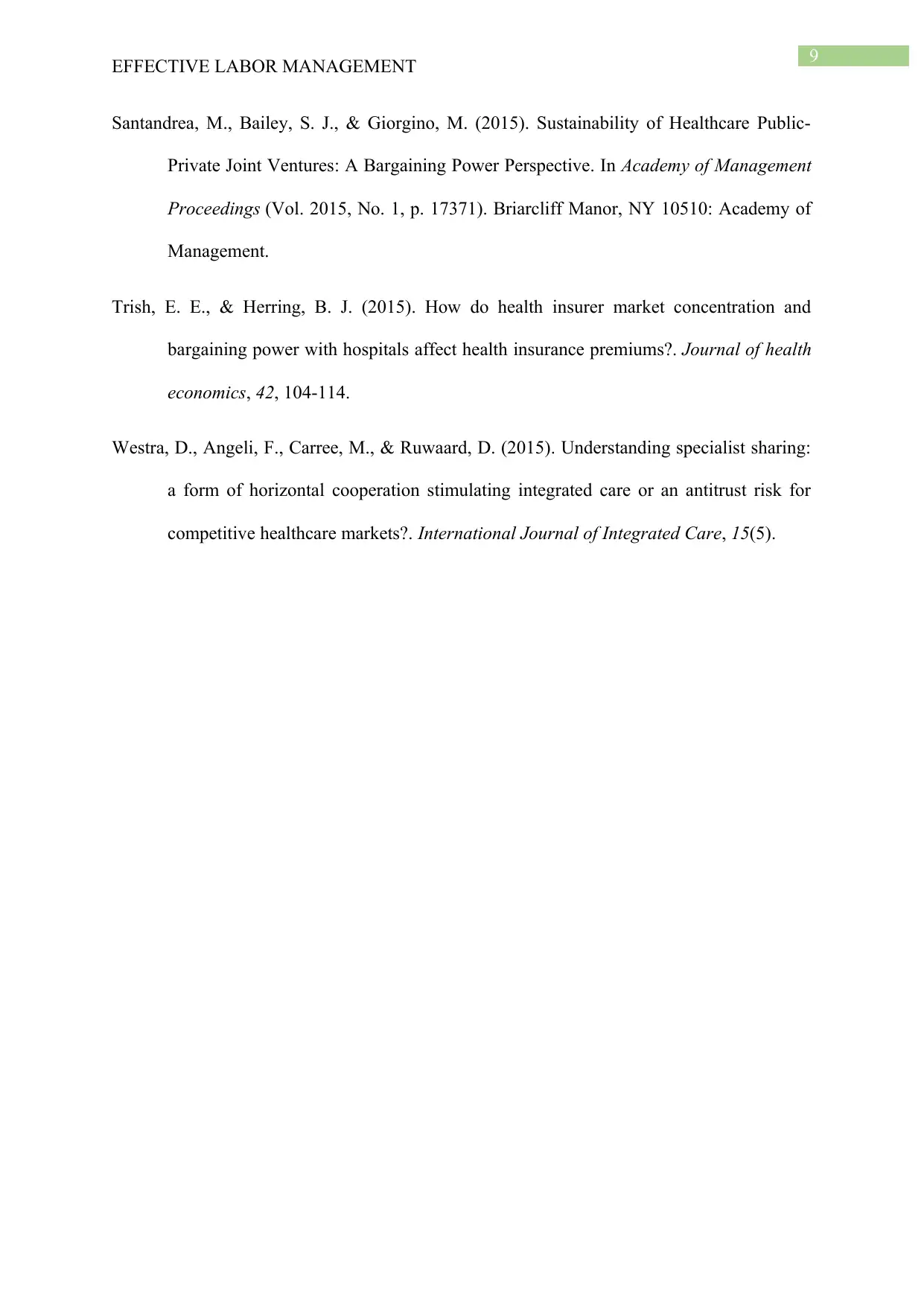
9
EFFECTIVE LABOR MANAGEMENT
Santandrea, M., Bailey, S. J., & Giorgino, M. (2015). Sustainability of Healthcare Public-
Private Joint Ventures: A Bargaining Power Perspective. In Academy of Management
Proceedings (Vol. 2015, No. 1, p. 17371). Briarcliff Manor, NY 10510: Academy of
Management.
Trish, E. E., & Herring, B. J. (2015). How do health insurer market concentration and
bargaining power with hospitals affect health insurance premiums?. Journal of health
economics, 42, 104-114.
Westra, D., Angeli, F., Carree, M., & Ruwaard, D. (2015). Understanding specialist sharing:
a form of horizontal cooperation stimulating integrated care or an antitrust risk for
competitive healthcare markets?. International Journal of Integrated Care, 15(5).
EFFECTIVE LABOR MANAGEMENT
Santandrea, M., Bailey, S. J., & Giorgino, M. (2015). Sustainability of Healthcare Public-
Private Joint Ventures: A Bargaining Power Perspective. In Academy of Management
Proceedings (Vol. 2015, No. 1, p. 17371). Briarcliff Manor, NY 10510: Academy of
Management.
Trish, E. E., & Herring, B. J. (2015). How do health insurer market concentration and
bargaining power with hospitals affect health insurance premiums?. Journal of health
economics, 42, 104-114.
Westra, D., Angeli, F., Carree, M., & Ruwaard, D. (2015). Understanding specialist sharing:
a form of horizontal cooperation stimulating integrated care or an antitrust risk for
competitive healthcare markets?. International Journal of Integrated Care, 15(5).
1 out of 10
Your All-in-One AI-Powered Toolkit for Academic Success.
+13062052269
info@desklib.com
Available 24*7 on WhatsApp / Email
![[object Object]](/_next/static/media/star-bottom.7253800d.svg)
Unlock your academic potential
Copyright © 2020–2025 A2Z Services. All Rights Reserved. Developed and managed by ZUCOL.
